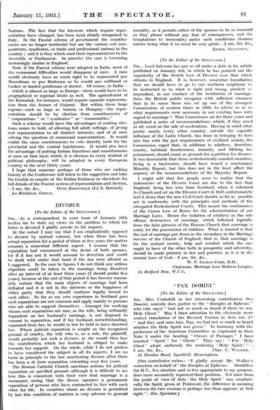[To the Editor of the SPECTATOR.]
Sift,—Lord SalveSen has put us all under a debt in his article published on January 3rd, in which he has pointed out the superiority of the Scotch Law of Divorce over that which obtains in England. It is, however, somewhat humiliating that we should have to go to our northern neighbour to be instructed as to what is right and wrong, prudent or imprudent, in our conduct of the institution of marriage. Does the British public recognize with sufficient clearness that in its name there was set up one of the strongest Commissions of modern times in 1909, to advise us as to what requirements were necessary in our existing laws with regard to marriage ? That Commission sat for three years and published a series of recommendations, which, if they erred at all, erred on the side of moderation. Having in mind what pretty nearly every other country, outside the soporific influence of the Latin Church, has done in bringing its laws into line with the just requirements of civilized society, the Commission urged that, in addition to adultery, desertion, cruelty, habitual drunkenness, insanity, and lifelong im- prisonment, should count as grounds for a petition for divorce. It was lamentable that three ecclesiastically-minded members, living in a backwater, should have issued a reactionary Minority Report, but this does not in the least affect the urgency of the recommendations of the Majority Report.
I might add that few people seem to realize that the indecencies of the Divorce Court are due to the fact that England, being less wise than Scotland, when it reformed its Church and set up the Divorce Court in 1857, unfortunately laid it down that the new Civil Court should, as far as possible act in conformity with the principles and methods of the abrogated Ecclesiastical Courts. This meant the continuance of the Canon Law of Rome for the administration of our Marriage Laws. Hence the isolation of adultery as the sole offence destructive of marriage, which followed logically from the false premise of the Roman Church that marriage ii solely for the procreation of children. What is wanted is that the end of marriage put down as the secondary in the Marriage Service of the Church of England, that is, that marriage is for the mutual society, help and comfort which the one ought to have of the other both in prosperity and adversity; should be made primary in. law and practice, as it is in th3 eternal laws of God.—I am, Sir, &c.,
W. F. GEIKIE-COBB, D.D., Chairman, Marriage Law Reform League. 13 Bedford Row, W.C.1.




































 Previous page
Previous page